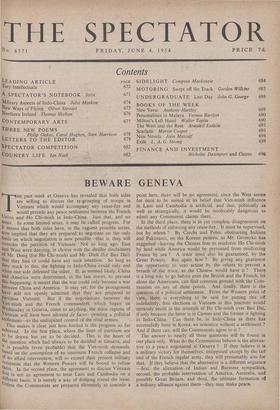BEWARE GENEVA
This makes it clear just how limited is the progress so far achieved. In the first place, where the lines of partition are to be drawn has yet to be decided. This is the heart of the question which had always to be decided at Geneva, and It Is possible (even probable) that the Viet-minh demands, based on the assumption of an imminent French collapse and Of no allied intervention, will so exceed their present military conquests that the Western Powers will be bound to refuse them. In the second place, the agreement to discuss Vietnam first is not an agreement to treat Laos and Cambodia on a 1.!lferent basis; it is merely a way of dodging round the issue. unless the Communists are prepared ultimately to concede a point here, there will be no agreemeni, since the West seems for once to be united in its belief that Viet-minh influence in Laos and Cambodia is artificial, and that, politically' as well as strategically, it would be intolerably dangerous to admit any Communist claims there.
In the third place, there is as yet complete disagreement on the methods of enforcing any cease-fire. It must be supervised, but by whom ? By Czechs and Poles, obstructing Indians and Pakistanis, on the Korean pattern, as Mr. Gromyko has suggested—leaving the Chinese free to reinforce Ho Chi-minh by land while America would be prevented from reinforcing France by sea ? A truce must also be guaranteed, by the Great Powers. But again how ? By giving any guarantor the opportunity to veto action by the others to prevent a breach of the truce, as the Chinese would have it ? Ther9 is a long way to go before even the British and the French, let alone the Americans, can find common ground with the Com- munists on any of these points. And finally, there is the question of a political settlement. From the Western point of view, there is everything to be said for putting this off indefinitely; free elections in Vietnam at this juncture would certainly result in the triumph of Ho Chi-minh over Bao Dai, if only because the latter is in Cannes and the former is fighting in Indo-China. Can there be, in Indo-China as there has successfully been in Korea, an armistice without a settlement ? And if there can, will the Communists agree to it ?
The answer to nearly all these questions will be found in one place only. What do the Communists believe is the alterna- tive to a peace negotiated at Geneva ? If they believe it is a military victory for themselves, unopposed except by the tail- end of the French regular army, they will presumably aim for that. If they believe that the alternative is a different sequence —first, the alienation of Indian and Burmese sympathies, second, the probable intervention of America, Australia. and possibly Great Britain, and third, the ultimate formation of a military alliance against them—they may make peace.


































 Previous page
Previous page